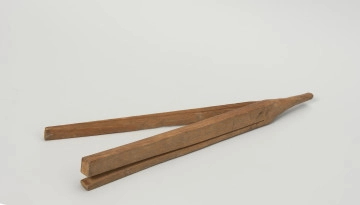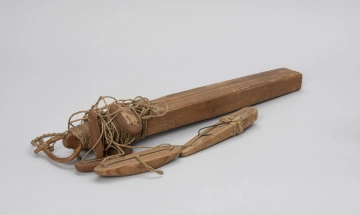
Hook clasp
1901 — 1950
National Museum in Szczecin
Part of the collection: Traditional fishing
Floating fishing lines, also called pęczki and in Pomerania also pupy (from German), were a type of passive fishing line, and according to some classifications, a variation of eel fishing lines. They consisted of a float or a bundle of rushes, a line, and a hook. The floats used were made from poplar bark and cork, the lines from hemp or cotton fiber, and the hooks were usually obtained from the local blacksmith. Fishermen typically baited the hook with bleak, ruffe, or another small fish, or sometimes a piece of a larger fish or an earthworm. These lines, usually numbering several dozen, were spread across lakes from spring to late autumn, though primarily in summer. Occasionally, they were used in river bends where the water was calm. Typically, dozens of lines were thrown into the water in the evening, so that the wind would carry them to the other side of the body of water or bay by morning, where they would be retrieved, sometimes using a special hook. They were used to catch carnivorous fish, such as eels. Fishing with pęczki was considered very efficient, which is why they were used not only by professional fishermen but also by poachers. The floating fishing line here, originating from the village of Domysłów in the Wolin municipality, was donated to the Pomeranian Ethnography collection in 1970. Małgorzata Kłosińska-Grzechowiak
Other names
pęczek, pupa (Germanism)
Author / creator
Object type
węda (setline float)
Technique
planing, żłobienie, tying (assembly), forging
Material
cork, cotton string, metal
Origin / acquisition method
donation
Creation time / dating
Creation / finding place
Owner
The National Museum in Szczecin
Identification number
Location / status

unknown
1901 — 1950
National Museum in Szczecin

unknown
1901 — 1950
National Museum in Szczecin

unknown
1901 — 1950
National Museum in Szczecin
DISCOVER this TOPIC
National Museum in Szczecin
DISCOVER this PATH
Educational path
0/500

We use cookies to make it easier for you to use our website and for statistical purposes. You can manage cookies by changing the settings of your web browser. More information in the Privacy Policy.
We use cookies to make it easier for you to use our website and for statistical purposes. You can manage cookies by changing the settings of your web browser. More information in the Privacy Policy.
Manage cookies:
This type of cookies is necessary for the website to function. You can change your browser settings to block them, but then the website will not work properly.
WYMAGANE
They are used to measure user engagement and generate statistics about the website to better understand how it is used. If you block this type of cookies, we will not be able to collect information about the use of the website and we will not be able to monitor its performance.